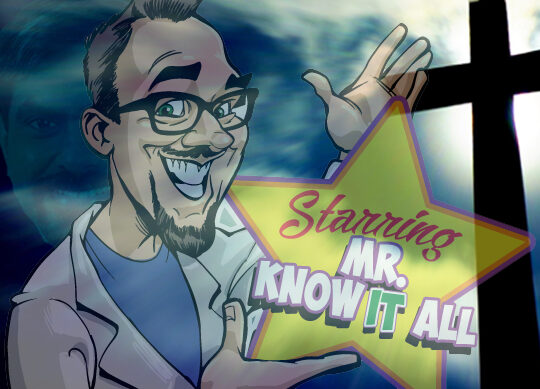Incomplete!

Are you sure? Really? That the guy speeding in the other lane is a maniac and doesn’t know how to drive and has no regard for others’ safety? Or that the reptilian-paced driver is an idiot and also doesn’t know how to drive and has no respect for others behind? Yeah, yeah, yeah, we’ve all done that: we’ve come to conclusions, we’re absolutely sure of them, and we’re unwilling to think otherwise.
Well, we may have to. Say scientists from Johns Hopkins University, Stanford, and The Ohio State University, in “The Illusion of Information Adequacy” published late last year in Public Library of Science ONE.
Yes, and I’m sorry to report that …
Researchers have discovered that the more confident you feel about your stance, the more likely you are to be working with incomplete information. It’s a psychological quirk that might explain everything from family disagreements to international conflicts. What if that slow driver is carefully transporting a wedding cake, or the speeding car is rushing someone to the hospital?”
Apparently, those snap judgments we are prone to make are manifestations of “The Illusion of Information Adequacy”: our mistaken tendency to believe we have enough information to make sound decisions, when we don’t.
Co-author Angus Fletcher:
We found that, in general, people don’t stop to think whether there might be more information that would help them make a more informed decision. If you give people a few pieces of information that seems to line up, most will say ‘that sounds about right’ and go with that. Yet, individuals often have no way of knowing what they don’t know.”
Or, as Socrates declared:
You don’t know what you don’t know!”
I have nothing against ye olde Greek philosopher, but I like Donald Rumsfeld’s version better:
There are known knowns. These are things we know that we know. There are known unknowns. That is to say, there are things that we know we don’t know. But there are also unknown unknowns. There are things we don’t know we don’t know.”
(That’s quite profound, coming from an American politician, twice secretary of defense under two different presidents.)
Reported the authors:
Anecdotally, friction between parties holding divergent perceptions seems particularly prevalent in today’s world—clashes over vaccines, abortion rights, … and climate change surface in the news regularly. Conflicts on social media, between passengers and flight attendants, and among parents and referees at children’s sporting events seem equally common. Correspondingly, the need to ascertain the various causes of poor perspective taking feels particularly acute at present. People presume that they possess adequate information—even when they lack half the relevant information or be missing an important point of view.”
Fletcher again:
In fact, those with only half the information were actually more confident in their decision to merge or remain separate than those who had the complete story. hey were quite sure that their decision was the right one, even though they didn’t have all the information.”
In other words …
We know nothin’!”
Not so God!
Yahweh, You have examined me and You know;
You—You have known my sitting and my rising;
You have understood my thought from afar.
My wayfaring and my lying down You have measured,
and [with] all my paths You are familiar.
For there is not an utterance on my tongue,
[and] behold, Yahweh, You have known it all.
Behind and in front You have enclosed me,
and You set upon me Your palm.
Too wonderful [is this] knowledge for me;
it is too high, I am incapable of [grasping] it.
Psalm 139:1–6
SOURCE: PLoS ONE; StudyFinds












 Abe Kuruvilla is the Carl E. Bates Professor of Christian Preaching at The Southern Baptist Theological Seminary (Louisville, KY), and a dermatologist in private practice. His passion is to explore, explain, and exemplify preaching.
Abe Kuruvilla is the Carl E. Bates Professor of Christian Preaching at The Southern Baptist Theological Seminary (Louisville, KY), and a dermatologist in private practice. His passion is to explore, explain, and exemplify preaching.